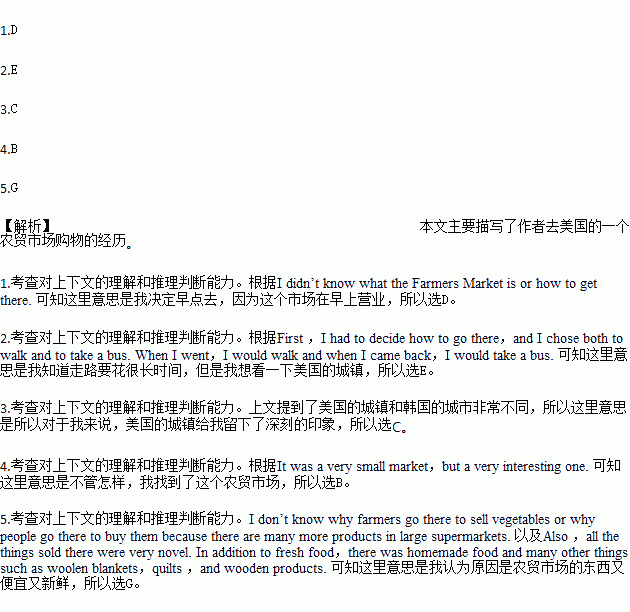题目内容
The Farmers’ Fresh Market
This morning,I went to the Farmers Market in Burlington ,Vermont. I didn’t know what the Farmers Market is or how to get there. 1.
First ,I had to decide how to go there,and I chose both to walk and to take a bus. When I went,I would walk and when I came back,I would take a bus. 2.
Walking to the market in this city,I was surprised because every house was beautiful,and they were all arranged in good order. In Korea’s cities,most houses are not like that,and many apartments are like boxes which often screen off beautiful views like hills and mountains. Also,every road is not straight and narrow. 3.
4.It was a very small market,but a very interesting one. I don’t know why farmers go there to sell vegetables or why people go there to buy them because there are many more products in large supermarkets. 5.
Also ,all the things sold there were very novel. In addition to fresh food,there was homemade food and many other things such as woolen blankets,quilts ,and wooden products.
I wanted to buy some of them,but I didn’t need them,so I just looked at them. It was a very exciting experience.
A. I visited a flower stand at the market.
B. Anyway,I was able to find the Farmers’ Market.
C. So, to me, this American town was very impressive.
D. I decided to go early because the market is held in the morning.
E. I knew that it would take a long time to walk,but I wanted to see an American town.
F. I was attracted by the comfortable houses where they lived and the cars that they drove.
G. I think the reason is that the ones sold in the Farmers’ Market are fresher and cheaper.
 天天向上一本好卷系列答案
天天向上一本好卷系列答案 小学生10分钟应用题系列答案
小学生10分钟应用题系列答案Monday | ||
8 —10 a. m. | TECHNOLOGY Information Technology (IT)—Using the Internet In this lesson, students learn how to surf the internet safely and effectively. There will also be information about using different search engines. | |
10:00 a. m. | DRAMA Students learn the play that the teacher gave before class. During this lesson, students will have the chance to act out roles with other students. | |
11:00 a. m. | PAINTING WITH WATERCOLOURS For most of this term, students learn how to use watercolours properly to make pictures. If the weather is good, the lesson may take place outdoors. | |
2 — 4 p. m. | SPORTS Students learn about the skills in a certain sport by watching video to see real action from past games. And then, students will play a short match lasting 45 minutes. This week, the sports are football (for boys) and tennis (for girls). | |
| HOMEWORK IT—the teacher will give students websites to look up at home. (about 20 minutes) Drama –students have to learn a part for the next lesson (about 40 minutes). | |
1.At _______, students are having a painting lesson.
A. 11:35 a. m. B. 4:30 p. m.
C. 10:30 a. m. D. 2:15 p. m.
2.Students should prepare a new part of _______ ahead of time as their homework.
A. Technology B. Painting
C. Sports D. Drama
3.The information in the table is mainly for students to _______.
A. choose teachers B. do their homework
C. take classes D. organize hobby groups


 ),并在其下面写出该加的词。
),并在其下面写出该加的词。